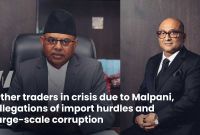China Expands Uyghur Crackdown Under MA Xingrui’s Leadership

Under the leadership of MA Xingrui, Communist Party Secretary of the Xinjiang Uyghur Autonomous Region, China's repression of Uyghur Muslims has intensified, drawing global condemnation. Despite expectations that his technocratic background might usher in a more moderate approach, MA Xingrui has overseen a period of heightened persecution, marked by mass detentions, forced labor, and the systematic erosion of Uyghur cultural identity.
Reports indicate that over 1 million Uyghurs remain in detention camps, initially framed as "re-education" facilities but now widely regarded as tools for cultural suppression. Forced labor programs, particularly those tied to China's Belt and Road Initiative, have expanded, raising ethical concerns in global supply chains. Activists argue that these measures aim to dismantle Uyghur identity while advancing Beijing’s geopolitical objectives.
MA Xingrui’s leadership has also seen the geographical scope of repression widen. Uyghurs across China are targeted, with individuals forcibly returned to Xinjiang from cities like Shanghai and Beijing. Abduweli Ayup, a Norway-based activist, highlights numerous cases of Uyghurs being arrested and relocated, their whereabouts remaining unknown. This crackdown extends beyond China’s borders, with Uyghur exiles reporting harassment, surveillance, and threats to their families back home.
The targeting of influential Uyghurs has also intensified. Rehmutulla Semet, a prominent businessman, was sentenced to 19 years in prison on what activists describe as fabricated charges. His assets, worth over $400 million, were seized and auctioned off by the government. Such actions signal Beijing’s broader strategy to strip Uyghurs of economic power and influence.
International observers, including human rights organizations and Western governments, have labeled China’s actions as genocide and crimes against humanity. However, Beijing continues to frame its policies as counter-terrorism measures, a narrative contradicted by mounting evidence of cultural suppression, forced labor, and arbitrary detentions.
Activists and exiled Uyghurs are urging the international community to take concrete action. Proposals include imposing sanctions on officials like MA Xingrui, scrutinizing supply chains for forced labor, and offering stronger protections for Uyghur refugees. Madina Mehmet, an exiled Uyghur, underscores the human cost of inaction: “They’ve committed no crime. My sister’s children deserve to grow up with their mother.”
As China’s reach extends globally, calls for accountability grow louder. The world’s response, advocates argue, will determine whether justice can prevail for the Uyghur people.




![From Kathmandu to the World: How Excel Students Are Winning Big [Admission Open]](https://nepalaaja.com/index.php/img/70194/medium/excel-college-info-eng-nep-2342.jpg)
